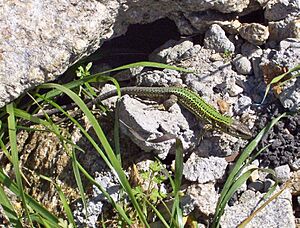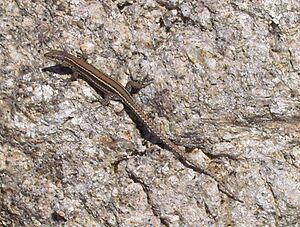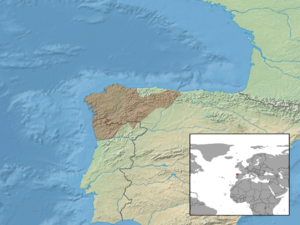Bocage's wall lizard facts for kids
Quick facts for kids Bocage's wall lizard |
|
|---|---|
 |
|
| Male | |
 |
|
| Female | |
| Conservation status | |
| Scientific classification |
|
| Kingdom: | Animalia |
| Phylum: | Chordata |
| Class: | Reptilia |
| Order: | Squamata |
| Family: | Lacertidae |
| Genus: | Podarcis |
| Species: |
P. bocagei
|
| Binomial name | |
| Podarcis bocagei (Seoane, 1885)
|
|
 |
|
| Script error: The function "autoWithCaption" does not exist. | |
| Synonyms | |
|
|
Script error: No such module "Check for conflicting parameters".
The Bocage's wall lizard (Podarcis bocagei) is a small lizard. It belongs to the Lacertidae family, which includes many types of wall lizards. This special lizard lives only in the Iberian Peninsula, which is where Portugal and Spain are located. You can find it in different places like forests, bushy areas, sandy beaches, gardens, and even in cities. Good news! This lizard is not considered to be in danger of disappearing.
Contents
What's in a Name? The Bocage's Wall Lizard
The name bocagei comes from a famous person. Both the lizard's scientific name and its common name honor a Portuguese zoologist. His name was José Vicente Barbosa du Bocage.
Meet the Bocage's Wall Lizard
This lizard grows to about 7 centimeters (almost 3 inches) long. This measurement is from its snout to the base of its tail. Its tail can be twice as long as its body! Male lizards are usually bigger than females.
The Bocage's wall lizard is a strong lizard. It looks a bit flat and is similar to the Carbonell's wall lizard. The top of its body is often gray or yellowish-brown. Sometimes, male lizards can even be green. They have many dark spots arranged in rows. The sides of their body might be brownish or yellowish.
The underside of the lizard can be white, yellow, pink, or orange. Unlike some other lizards, it does not have small blue spots on its belly.
Where Does the Bocage's Wall Lizard Live?
You can find the Bocage's wall lizard in northern Portugal. It also lives in northwestern Spain. Its range goes as far south as the River Douro.
Home Sweet Home: Bocage's Wall Lizard Habitats
This lizard likes to live in open deciduous woodland. It also lives in scrubland areas. You can find it on coastal sand dunes too. They even live in places where people grow crops, including small villages. These lizards can live from sea level up to about 1,900 meters (6,200 feet) high.
How Bocage's Wall Lizards Have Babies
Bocage's wall lizards lay eggs. This means they are oviparous. Females that are old enough to have babies lay eggs several times a year. They can lay between 2 and 4 groups of eggs each year. Each group, called a clutch, can have from 2 to 9 eggs.
Is the Bocage's Wall Lizard in Danger?
The Bocage's wall lizard is quite common. It lives in many suitable places within its home range. The number of these lizards is stable. They do not face any major threats right now. Because of this, the International Union for Conservation of Nature (IUCN) says its status is "least concern". This means it is not considered threatened.
 | John T. Biggers |
 | Thomas Blackshear |
 | Mark Bradford |
 | Beverly Buchanan |


